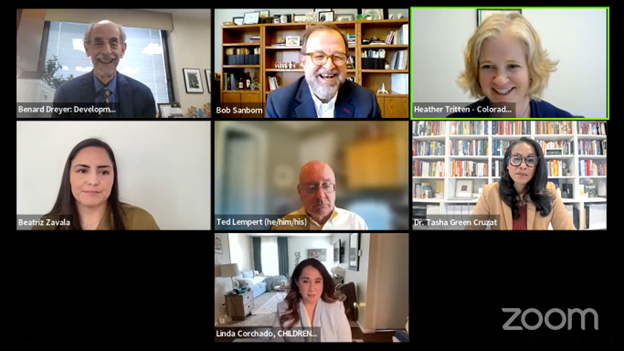
Our vision is for the state of Texas to offer a welcoming environment for immigrants and refugees where immigrant children can integrate and access the resources they need to learn, grow and thrive. While the diversity of our immigrant community enriches our state, it also adds complexity to the strategies needed to address their varied needs.
The Children’s Immigration Network is CHILDREN AT RISK’s effort to focus on immigrant children. Use the button below to be among the first to read our next quarterly newsletter.
MAY IS MENTAL HEALTH AWARENESS MONTH
A message from Senior Director, Linda Corchado
We are highlighting the importance of supporting children’s mental health by highlighting how migration impacts immigrant children and the critical role our schools can play in improving their quality of life.
Before even stepping into a classroom, many immigrant students have endured arduous journeys often marked by violence, instability, and loss. These experiences can include traumatic events such as witnessing or being victims of violence, enduring long separations from parents or caregivers, or surviving hazardous journeys, such as crossing deserts or seas in search of safety.
Almost 80% of migrants reported exposure to violence in their country of origin as the precipitating factor for their migration and 20% of these individuals’ reported exposure to sexual violence. Roughly 33% of migrant and refugee children report having witnessed domestic violence and 60% report having witnessed death or serious injury. A 2019 study found that 17% of Central American youth held with their mothers in a detention center met criteria for PTSD, compared to the United States average of 4.7% meeting criteria for PTSD.
In the school settings, educators create a supportive environment for immigrant students when they acknowledge that traumatic stress impacts cognitive functions like attention, memory and decision making crucial for academic success. As students grapple with anxiety, PTSD, depression and emotional regulation, their educational outcomes are also impaired.
The classroom can be a peaceful place where students experience consistency, a sense of normalcy and can form positive relationships with adults and peers. Getting there requires a trauma informed approach where administrators, educators, students and families are working in community to improve the classroom setting. Importantly, this also involves including wraparound services, including additional mental health supports and social workers to support families.
PARTNER PROFILE
An interview with Yenny James, Founder & CEO, Paradigm Doulas | Fort Worth, TX

Yenny James
Founder & CEO, Paradigm Doulas
Paradigm Doulas provide training on preconception, birth and postpartum doula support with a special focus on dismantling personal and systemic racism that contribute to barriers to reproductive justice and liberation. Ms. James is a doula and community health worker and has worked in the perinatal health space for over 10 years.
As her role of CEO, Ms. James trains and certifies aspiring doulas in communities across the US and promotes ways to support families from diverse backgrounds and cultures throughout their reproductive journey, including immigrants and refugees.
What do you wish more people understood about maternal health needs for immigrant mothers?
There are many factors that can negatively impact birth outcomes and experiences for immigrant families. When an expectant parent makes the decision to leave their home and lives behind in their native country, most do so in hopes that they can provide a safe environment and better future for their children.
In their search for safety and freedom, they are faced with inhumane conditions at detention facilities at the border and the uncertainty of what their future holds. Many have limited access to prenatal care which is a primary cause of late prenatal care.
The external and internal factors that immigrant parents experience can directly impact pregnancy and the postpartum period. In our communities, I have seen an increase in preterm labor and delivery resulting in infant mortality. I have also seen an increase in postpartum mood disorders, such as postpartum depression and anxiety, which impacts lactation as well as their physical healing after delivering. While prenatal care may be established once they are granted entry into our country, many immigrant parents experience lack of access to transportation, and face language barriers that make it difficult to be a participant in their plan of care.
Many are here alone, so every person in the healthcare system who comes in contact with immigrant parents may be the only person that they can rely on to help navigate the healthcare system, and life.
What’s your approach to cultural sensitivity in this space?
My approach to cultural sensitivity in this space is centering humanity and practicing cultural humility. When we center humanity, we treat everyone with respect regardless of our differences in cultural experiences or views. This allows us to provide culturally appropriate care to every person and family who we support.
When we practice cultural humility, we are acknowledging that we all have biases and address those biases. As perinatal health workers, this helps us build trusting relationships with parents and helps us be more empathetic.
Can you share one of the biggest lessons you’ve learned while working with immigrant families?
Working with immigrant families and refugees made me more grateful for the sacrifices that my mother made when she decided to leave our native country and come to the United States when I was three years-old. Her journey to a new country was filled with challenges and uncertainty, yet she faced each obstacle with unwavering strength and resilience.
Leaving behind everything she knew; she embraced the unknown in pursuit of a better life for us. From working multiple jobs to learning a new language, to navigating unfamiliar systems and cultures, her determination and sacrifices laid the foundation for our future opportunities. Just like my mother, the selflessness and perseverance of immigrants and refugees continue to inspire me every day, reminding me of the invaluable gift of their sacrifices and the enduring love that drives their actions.
IN CASE YOU MISSED IT
Members of the Children’s Immigration Network rallied from across the nation to respond to the involuntary bussing of migrant families.
During this press conference on April 11, our partners highlighted critical issues arising from Operation Lone Star, noting its disruptive effects on families and the strain it places on local support systems. CHILDREN AT RISK emphasizes the importance of a humane, child-centered approach to address the unique challenges at the border, urging a focus on all children, regardless of their immigrant status.
Children Now points out the severe trauma experienced by children undergoing long, perilous migrations. They advocate for connecting migrant children with relatives and health services rather than dispersing them to potentially unsupported environments.
Children’s Advocates for Change highlight the plight of asylum seekers fleeing violence and economic collapse. They call for enhanced federal coordination and funding to support the mental and physical health needs of these individuals as they await legal proceedings.
The Colorado Children’s Campaign urges better inter-state and agency cooperation to ensure that children and families transition smoothly and access essential resources. They also call for increased investment in local services to support the holistic needs of newcomer children.
H.O.M.E. advocates for treating vulnerable children and their families with dignity, providing them with comprehensive, non-coercive information to find safe healing spaces.
Dr. Benard P. Dreyer, Director of Developmental Behavioral Pediatrics at Bellevue Hospital Center, emphasizes that healthcare, including essential services like prenatal care and vaccinations, should be accessible to asylum seekers at the southern border, advocating for collaborative efforts to address this humanitarian crisis compassionately.
Press conference participants included Dr. Bob Sanborn, President & CEO, CHILDREN AT RISK (C@R); Linda Corchado, Director of Immigration, C@R; Ted Lempert, President, Children Now; Dr. Tasha Green Cruzat, President, Children’s Advocates for Change; Heather Tritten, President & CEO, Colorado Children’s Campaign; Beatriz Zavala, Clinical Coordinator, Humanitarian Outreach for Migrant Emotional Health (H.O.M.E.); Dr. Benard Dreyer, Professor of Pediatrics, Director of Developmental-Behavioral Pediatrics, Bellevue Hospital Center .
Two years since Texas leadership initiated the transportation of migrants released from federal custody to other states, over 102,000 individuals have been relocated to cities such as New York, Chicago, Denver, Philadelphia, Los Angeles, and Washington, D.C. Despite the challenges posed by this influx, these cities—known for their welcoming stance towards immigrants—have strived to support and accommodate the newcomers, particularly the children.
In response to the growing concerns about the impact of these policies on the mental health and well-being of immigrant children, our organization is collaborating with key partners nationwide, including Children Now, the Colorado Children’s Campaign, the Citizens Committee for Children, and Children’s Advocates for Change. Together, we are advocating for necessary support mechanisms to counteract the adverse effects these policies have on immigrant families during this unprecedented time.
